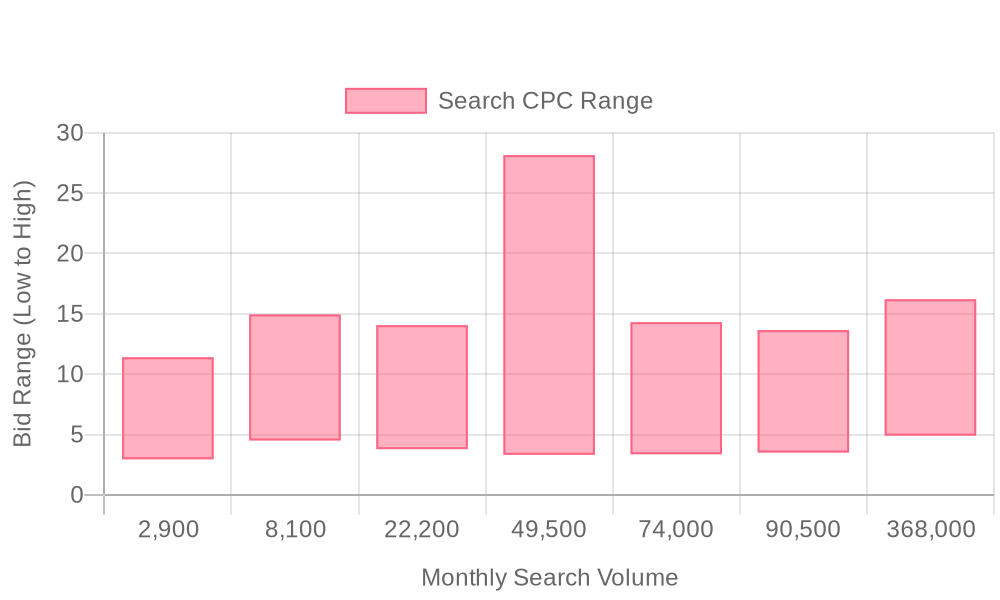
Supercharge your lead generation with a FREE Google Ads audit - no strings attached! See how you can generate more and higher quality leads
Get My Free Google Ads AuditFree consultation

No commitment
Supercharge your lead generation with a FREE LinkedIn Ads audit - no strings attached! See how you can generate more and higher quality leads
Get My Free Google Ads AuditFree consultation

No commitment
Supercharge your lead generation with a FREE Meta Ads audit - no strings attached! See how you can generate more and higher quality leads
Get My Free Google Ads AuditGet My Free LinkedIn Ads AuditGet My Free Meta Ads AuditFree consultation

No commitment
Supercharge your lead generation with a FREE Google Ads audit - no strings attached! See how you can generate more and higher quality leads
Get My Free Google Ads AuditFree consultation

No commitment
In the competitive world of medical insurance marketing, Google Ads stands out as a powerful tool. Navigating an intricate network of customer interactions, these ads intercept potential clients at critical moments when they seek solutions. For businesses in the medical insurance sector, mastering this tool can bridge both online and offline marketing strategies: capturing high-intent queries, targeting with precision using industry-specific language, and achieving comprehensive ROI tracking. Whether after a trade show encounter or in response to a direct mail piece, Google Ads ensures you're present when it matters.

Smart healthcare marketers prioritize data quality and precision to improve lead flow at every stage. In the medical insurance space, Google Ads provides a channel to deploy budget where in-market demand is highest, connecting qualified prospects to tailored plan offerings with measurable impact. Discover how Google Ads strategies increased leads for a health insurance provider, and explore additional marketing and analytics insights that can fuel your own campaigns.
Sophisticated teams integrate Google Ads into their broader revenue strategy, using modern analytics to shift budget dynamically as high-value prospects emerge. With this approach, every dollar invested in Google Ads for Medical Insurance Plans is tracked across touchpoints, ensuring that performance insights fuel continuous optimization and drive higher conversion rates. Leverage Sona’s Buyer Journeys to track interactions across both individuals and entire buying committees, and see how measuring marketing’s influence can help you attribute results more accurately.
Medical insurance campaigns succeed when search intent, historical engagement data, and real-time analytics inform every decision. By leveraging unified data from CRM, site analytics, and ad platforms, revenue teams can allocate spend toward audiences most likely to convert. Sona elevates this approach by seamlessly linking online and offline behaviors, capturing the full buyer journey and enabling attribution at both the account and individual level. This integrated view allows teams to identify not just clicks, but actual policy inquiries and sign-ups, so marketing ROI is always laser-focused.
Success in Google Ads health insurance campaigns depends on the ability to identify and engage high-intent audiences. Advanced platforms now pinpoint which anonymous visitors are from target accounts, using IP enrichment and behavioral signals to reveal who is evaluating coverage options. Sona’s Audiences tool creates dynamic audience lists based on real in-market activity—like repeat visits to enrollment pages or downloads of plan comparison guides. As leads progress, these audiences automatically update, ensuring messaging and offers always align with each prospect's current stage.
Maximizing conversion rates for health insurance advertising means more than attractive ad copy. Each landing experience should be designed to match the needs and concerns of its audience segment, presenting trust signals like compliance badges, transparent pricing, and step-by-step enrollment guides. With unified campaign data, teams can test and personalize creative rapidly, measuring downstream effects not just in form fill rates but in verified, qualified leads. This approach also supports compliance initiatives, with real-time checks ensuring that no protected health information is inadvertently captured or exposed.
Google Ads for Medical Insurance Plans delivers the highest ROI when it is not siloed, but connected to social, email, and outbound channels. Unified platforms make it possible to sync enriched leads from Google Ads directly into sales tools like HubSpot or Salesforce, ensuring fast, compliant handoff to brokers or call centers. When CRM and ad audiences are kept in lockstep, remarketing efforts become smarter: teams can exclude closed deals, accelerate mid-funnel prospects, and trigger omnichannel nurture sequences that drive higher policy conversions and lower acquisition costs. This connected strategy supports every stage of the customer journey, from awareness through enrollment, with data-driven precision.
Ready to transform your medical insurance lead generation? Get started for free with Sona.
Medical insurance providers face a digital environment where audience complexity and compliance limit the reach of traditional marketing channels. Google Ads delivers precision by identifying health plan administrators and key decision-makers at moments when they are actively seeking solutions, elevating the likelihood of meaningful engagement and higher conversion rates. For more strategies on elevating your digital acquisition, explore actionable playbooks for demand generation.
Timeliness is critical in medical insurance lead generation, particularly during open enrollment or in response to regulatory changes. Google Ads triggers campaigns based on real-time search intent, ensuring that marketing and sales teams act at the exact moment when prospects are most receptive. Advanced integrations empower teams to coordinate ad delivery with CRM follow-ups.
Higher-margin policies are often missed by slower channels like email, but Google Ads targets buyers actively searching for comprehensive plans. The platform’s ability to capture immediate demand is unmatched, especially when legislative updates or new policy windows open, giving insurers an edge in rapidly changing markets. See how Google Ads strategies have driven measurable results in the health insurance industry in this case study on increasing leads and conversions.
Expanding into new territories requires visibility beyond the scope of offline outreach or static digital tactics. Google Ads unlocks emerging digital markets, ensuring that medical insurance providers can scale efficiently while tracking performance in untapped regions. By leveraging real-time audience insights, marketing teams can discover and engage new segments as they emerge.
Unified data analysis is a persistent challenge for medical insurance campaigns, often resulting in incomplete ROI measurement due to untracked offline conversions. By connecting ad performance with sales outcomes through closed-loop attribution, marketers gain a clear view of the entire funnel. Ready to see the difference? Get started for free with Sona and see how unified analytics can optimize your health insurance marketing.

Search campaigns drive measurable results for medical insurance providers by capturing users with high intent at the exact moment they are seeking coverage. These campaigns use tailored keyword strategies to intercept searches for health insurance, Medicare, or specialized coverage options, ensuring every click represents a qualified opportunity. When marketers connect search activity to real-time audience data, they can move beyond anonymous queries and prioritize prospects showing strong buying signals. This approach allows budgets to be shifted toward high-converting accounts and enables revenue teams to personalize outreach based on specific search patterns. For inspiration, explore real-world Google Ads examples from health insurance providers.
Display ads keep medical insurance brands visible across healthcare content sites, news publications, and relevant blogs, reinforcing brand trust before prospects even enter the decision phase. Creative banners and responsive formats ensure that both individuals and business audiences are exposed to plan options, open enrollment reminders, and compliance credentials. When display targeting is linked to website visitor identification, marketers can identify not just web traffic but actual visitor companies, helping sales and marketing teams focus on organizations or employers most likely to convert. This granular visibility enables more meaningful retargeting and custom messaging that resonates with each segment. For more guidance on building high-converting healthcare ads, review actionable tips for Google Ads campaigns.
Video ads are highly effective for explaining complex insurance products, breaking down regulatory changes, or comparing plan tiers in an engaging, accessible format. Explainer videos and customer testimonials help demystify healthcare options for both brokers and direct consumers, leading to longer engagement times and stronger brand recall. By monitoring in-video engagement and tying those insights back to dynamic audience lists, marketers can adapt creative assets and follow-up strategies based on viewers’ actual interest and funnel stage. This ensures that high-value leads, such as those who watch full benefit walkthroughs, receive tailored offers and timely follow-ups. For diverse ideas on effective video ad formats, see these Google Ad examples across industries.
Remarketing campaigns reignite interest among visitors who explored coverage pages, started applications, or downloaded guides but did not convert. These ads address the common challenge in medical insurance marketing: manual follow-ups often lag, causing potential clients to lose momentum or seek competitors. When audience lists update in real time as leads move through the funnel, remarketing efforts become more precise. Marketers can deliver compliance-approved messaging to prospects who have shown high intent, maximizing conversion rates while also controlling for regulatory boundaries. With advanced conversion tracking, every remarketing touchpoint is mapped back to both online and offline actions, ensuring that ROI is measured at every stage of the buyer’s journey.
To see how these strategies can be tailored for your organization, get started for free with Sona.

Medical insurance marketers seeking growth must look beyond standard campaign tactics, identifying untapped audiences and precision channels that align with their unique value proposition. The most successful teams use advanced data and intent cues, maximizing every dollar by aligning message, audience, and timing.
In the rapidly evolving world of Google Ads for Medical Insurance Plans, growth is unlocked by integrating data-rich targeting, predictive modeling, and adaptive content distribution into every campaign. These strategies empower marketing and sales teams to continuously refine their approach, capturing more qualified demand while maintaining strict compliance and brand integrity. Ready to capture more growth opportunities? Get started for free with Sona.

Medical insurance marketers achieve higher conversion rates and lower acquisition costs when audience segmentation is precise and data-driven. Tailoring campaigns at the segment level creates more relevant touchpoints for prospects and leads, ultimately accelerating the path from interest to enrollment. For additional insights, explore our playbooks for demand generation.
Addressing unidentified leads requires closing the gap between anonymous website traffic and actionable prospect data. Visitor identification technologies allow marketers to surface company information and visitor context, transforming previously unaddressable web sessions into segmentable audiences. This means high-value, anonymous visitors can be recognized and added into re-engagement campaigns or routed to sales for immediate follow-up, improving pipeline velocity and segment accuracy. If you want to see how this works in practice, check out our guide to identifying website visitors.
Ready to turn segmented insights into real pipeline growth? Get started for free with Sona.

| Industry | Keyword | Monthly Search Volume | Competition Level | Low Bid | High Bid |
| Medical Insurance Plans | private healthcare | 2900 | MEDIUM | 2.95 | 11.4 |
| Medical Insurance Plans | medical insurance plans | 8100 | MEDIUM | 4.51 | 14.95 |
| Medical Insurance Plans | private health insurance | 22200 | MEDIUM | 3.79 | 14.06 |
| Medical Insurance Plans | humana medicare advantage | 49500 | MEDIUM | 3.32 | 28.15 |
| Medical Insurance Plans | medical insurance | 74000 | MEDIUM | 3.37 | 14.31 |
| Medical Insurance Plans | health insurance plans | 90500 | LOW | 3.51 | 13.65 |
| Medical Insurance Plans | health insurance | 368000 | MEDIUM | 4.91 | 16.21 |
A high-impact keyword strategy forms the foundation of effective Google Ads for Medical Insurance Plans. Precision targeting is essential: focusing on granular terms like "Google Ads health insurance" or "health insurance advertising" allows marketers to capture relevant, high-intent leads while ensuring compliance with sector regulations. For inspiration on campaign structure and keyword ideas, explore this collection of Google Ads examples from health insurance companies. Marketers can also access a library of actionable playbooks to further refine their approach.
High-quality lead tracking transforms keyword data into actionable insights, empowering teams to refine bidding, targeting, and budget allocation. When marketers unify conversion and visitor data, they move beyond anonymous impressions to identify which companies, segments, and regions drive the highest value pipeline. For teams seeking to reveal which companies and people are visiting their website—even without form fills—Sona Identification provides powerful visitor intelligence that supports strategic decision-making and reduces acquisition costs over time.
Measurable ROI depends on a closed-loop system that connects ad engagement to real-world conversions, both online and offline. With advanced attribution, healthcare advertisers can trace every qualified lead and policy sale back to specific keyword groups and campaigns. Gain deeper insight on accurate revenue attribution to enable rapid budget shifts toward top-performing terms, ensuring ongoing campaign optimization and greater efficiency.
Strategic value emerges by aligning campaign goals—such as increasing underserved market access or promoting ACA-compliant plans—with philanthropic messaging and measurable business outcomes. By using real-time audience lists that update as prospects move through the funnel, advertisers can deliver targeted messages at each stage, increasing the likelihood of conversion. Syncing enriched audiences directly into Google Ads and CRM platforms ensures that marketing and sales teams operate from a unified, up-to-date dataset, maximizing both reach and relevance.
Maximizing opportunities requires continuous analysis of keyword performance, including the identification of high-competition terms like "health insurance quotes" and lower-competition, long-tail variations such as "affordable health insurance for families." This balance of high-volume and niche targeting supports both short-term lead generation and long-term brand growth within the medical insurance landscape. To see how easily you can put these strategies into action, get started for free with Sona.
Precision in keyword selection drives the success of Google Ads for Medical Insurance Plans. Start with a foundation of terms directly related to specific offerings, such as "group health insurance for small businesses," "ACA-compliant health plans," and "HIPAA-compliant medical insurance." Expand these lists by including geo-targeted phrases and modifiers that signal buyer intent, like "health insurance quotes near me" or "medical insurance plans for startups." Negative keywords should be applied to eliminate irrelevant clicks and protect compliance. For inspiration, explore this collection of Google Ads examples from health insurance companies to see what’s working in the market.
Modern marketers can elevate targeting by moving beyond anonymous search data. Connecting digital visitor identification technology enables recognition of high-value companies and individuals who engage with specific keyword themes. By syncing enriched audiences into Google Ads, teams can shift budget toward high-converting segments and tailor messaging for each funnel stage. This approach ensures keyword investment aligns with accounts most likely to convert, not just those generating clicks.
Crafting ad copy for medical insurance advertising requires a blend of trust, urgency, and clarity. Lead with solutions to urgent pain points: address rising healthcare costs, compliance complexity, and enrollment deadlines. Incorporate social proof, such as "trusted by 500+ local employers" or "Google-certified health insurance partner," to strengthen credibility. Calls-to-action should be direct and actionable, urging prospects to "compare plans now" or "request a compliance review today." For additional guidance, review these actionable tips for building high-converting Google Ads campaigns for healthcare organizations.
A sophisticated campaign benefits from real-time intent data to fuel message relevance. By analyzing in-market search behavior and engagement patterns, advertisers can dynamically update ad copy for segments demonstrating increased readiness to buy. This continuous loop of creative optimization ensures that every impression maximizes resonance with the right audience, improving both click-through and conversion rates.
Landing pages for medical insurance campaigns must reflect the promise and clarity communicated in the ad. Align headline messaging with search intent, offering immediate access to plan comparisons, compliance resources, or enrollment tools. Trust indicators, such as certifications and privacy assurances, should be prominent. Streamlined forms reduce friction: collect only essential details like company size or ZIP code for personalized quotes, while maintaining HIPAA compliance. For further reading, see this overview on Google Ads healthcare policy compliance.
Effective landing page design is strengthened with integrated data pipelines. When marketers can identify both known and anonymous visitors, they unlock the ability to route high-intent traffic directly to sales teams or nurture them with personalized content. Dynamic audience segmentation ensures that each visitor, whether a broker or HR leader, sees content tailored to their business needs. This cohesive experience shortens the buyer journey and maximizes lead quality.
Continuous optimization is essential to sustain high ROI in healthcare advertising strategies. Attach offline conversion tracking to bridge the gap between digital engagement and real-world sales, capturing the full impact of ad spend. Analyze which keywords and campaigns drive policy sign-ups or broker appointments, then adjust bids and budgets accordingly. Review these best practices for medical Google Ads campaigns to ensure your strategies are up to date.
Real-time analytics power agile decision-making. Syncing CRM data with Google Ads enables the creation of dynamic audiences that evolve as leads progress through the sales funnel. When a prospect requests a quote, their audience status updates instantly, triggering tailored retargeting or suppressing unnecessary ads. This closed-loop attribution model ensures that every dollar invested in Google Ads for Medical Insurance Plans can be tied to business outcomes, not just digital metrics. To see these strategies in action, get started for free with Sona and unlock precise data-driven campaign optimization.
Expanding your medical insurance presence requires a data-centric approach that goes beyond basic campaign management. Combining granular audience insights with dynamic content strategies enables marketers to consistently outperform industry benchmarks and attract higher-value leads. For more tactical approaches, explore our actionable playbooks for demand generation.
Modern revenue teams can leverage unified data and advanced segmentation to create more precise and compliant Google Ads for Medical Insurance Plans. This allows for faster identification of high-intent accounts, streamlined lead qualification, and measurable growth in health insurance lead generation. See how Google Ads strategies increased health insurance leads and conversions for practical inspiration.
Cross-promotion of assets with retargeting helps maximize every website visit by connecting prior engagement to relevant offers. With audience identification technology, anonymous traffic becomes actionable as marketers can now pinpoint companies visiting key product pages. This intelligence drives timely retargeting sequences, ensuring that messaging aligns with the visitor’s exact stage in the buying journey.
Upselling with segmented audiences is a powerful way to increase lifetime value across your portfolio of medical insurance products. By dynamically updating audience lists as leads progress through the funnel, you ensure that new offers—such as supplemental dental or critical illness coverage—are presented only to those most likely to convert. Marketers can sync these segmented audiences with their CRM and Google Ads, enabling real-time activation of upsell and cross-sell campaigns for both online and offline engagement.
Localizing content is critical for medical insurance providers looking to dominate specific geographic markets. Tailored ad copy, local landing pages, and geo-targeted keyword strategies ensure relevance to diverse consumer needs within each region. By mapping intent signals to local search behavior, teams can allocate budget to the most promising ZIP codes and broker territories, driving cost-effective conversions while remaining compliant with state-level regulations.
Effective execution of Google Ads within the medical insurance sector relies on robust keyword curation, audience segmentation, and creative alignment. Leveraging actionable insights and machine learning, marketers achieve superior ROI, maintain compliance, and integrate seamlessly with broader marketing initiatives. Smart, data-driven decisions will solidify your leadership in health insurance advertising and help you uncover the next wave of growth. If you’re ready to accelerate your impact, get started for free with Sona.
Mastering Google Ads for medical insurance plans can significantly enhance your ability to attract the right audience, ensuring compliance and optimizing your marketing efforts. By strategically leveraging Google Ads, you address the unique challenges of promoting medical insurance services while staying within regulatory boundaries. This approach not only boosts your visibility but also streamlines lead generation, ultimately driving your business growth.
Throughout this article, we've explored the intricacies of using Google Ads effectively in the medical insurance industry. From understanding compliance requirements to crafting compelling ad strategies, each aspect plays a vital role in ensuring your campaigns are both legally sound and highly effective. By implementing these insights, you're equipped to navigate the digital landscape with confidence, transforming potential challenges into opportunities.
Imagine the impact of a well-executed Google Ads strategy that resonates with your target audience and meets all compliance standards. Embrace this potential for transformation by applying the strategies discussed. You have the tools to create campaigns that not only reach but engage your ideal customers, setting the stage for long-term success.
To further enhance your marketing capabilities and unify your go-to-market data, we invite you to start for free and experience our platform's powerful insights.
Advertising health insurance on Google requires compliance with sector regulations and the use of precise targeting and data-driven strategies to capture high-intent leads while adhering to privacy and compliance standards.
Effective Google Ads for medical insurance involve precision in keyword targeting, compelling ad copy, audience segmentation, and continuous data-driven optimizations to ensure high conversion rates and compliance.
The article does not specifically mention G2 certification; it focuses on strategies for optimizing Google Ads for medical insurance.
To ensure compliance, incorporate trust indicators on landing pages, avoid capturing protected health information, and align ad content with sector-specific requirements while using real-time checks to maintain privacy standards.
Improving ROI involves integrating Google Ads with CRM systems, using real-time audience insights for precise targeting, leveraging data-driven optimizations, and ensuring cross-channel integration for comprehensive reach and efficiency.
Join results-focused teams combining Sona Platform automation with advanced Google Ads strategies to scale lead generation

Connect your existing CRM

Free Account Enrichment

No setup fees
No commitment required

Free consultation

Get a custom Google Ads roadmap for your business
Join results-focused teams combining Sona Platform automation with advanced Meta Ads strategies to scale lead generation

Connect your existing CRM

Free Account Enrichment

No setup fees
No commitment required

Free consultation

Get a custom Google Ads roadmap for your business
Join results-focused teams combining Sona Platform automation with advanced LinkedIn Ads strategies to scale lead generation

Connect your existing CRM

Free Account Enrichment

No setup fees
No commitment required

Free consultation

Get a custom Google Ads roadmap for your business
Join results-focused teams using Sona Platform automation to activate unified sales and marketing data, maximize ROI on marketing investments, and drive measurable growth

Connect your existing CRM

Free Account Enrichment

No setup fees
No commitment required

Free consultation

Get a custom Google Ads roadmap for your business
Over 500+ auto detailing businesses trust our platform to grow their revenue
Join results-focused teams using Sona Platform automation to activate unified sales and marketing data, maximize ROI on marketing investments, and drive measurable growth

Connect your existing CRM

Free Account Enrichment

No setup fees
No commitment required

Free consultation

Get a custom Google Ads roadmap for your business
Over 500+ auto detailing businesses trust our platform to grow their revenue
Join results-focused teams using Sona Platform automation to activate unified sales and marketing data, maximize ROI on marketing investments, and drive measurable growth

Connect your existing CRM

Free Account Enrichment

No setup fees
No commitment required

Free consultation

Get a custom Google Ads roadmap for your business
Over 500+ auto detailing businesses trust our platform to grow their revenue
Our team of experts can implement your Google Ads campaigns, then show you how Sona helps you manage exceptional campaign performance and sales.
Schedule your FREE 15-minute strategy sessionOur team of experts can implement your Meta Ads campaigns, then show you how Sona helps you manage exceptional campaign performance and sales.
Schedule your FREE 15-minute strategy sessionOur team of experts can implement your LinkedIn Ads campaigns, then show you how Sona helps you manage exceptional campaign performance and sales.
Schedule your FREE 15-minute strategy sessionOur team of experts can help improve your demand generation strategy, and can show you how advanced attribution and data activation can help you realize more opportunities and improve sales performance.
Schedule your FREE 30-minute strategy sessionOur team of experts can help improve your demand generation strategy, and can show you how advanced attribution and data activation can help you realize more opportunities and improve sales performance.
Schedule your FREE 30-minute strategy sessionOur team of experts can help improve your demand generation strategy, and can show you how advanced attribution and data activation can help you realize more opportunities and improve sales performance.
Schedule your FREE 30-minute strategy sessionOur team of experts can help improve your demand generation strategy, and can show you how advanced attribution and data activation can help you realize more opportunities and improve sales performance.
Schedule your FREE 30-minute strategy session





Launch campaigns that generate qualified leads in 30 days or less.
